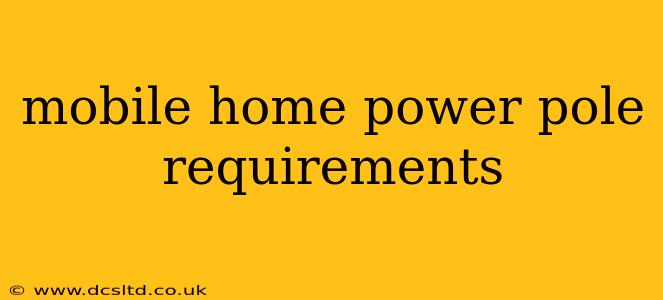Planning to install a power pole for your mobile home? Understanding the specific requirements is crucial for safety and compliance. This guide delves into the intricacies of mobile home power pole installations, covering everything from pole height and grounding to permitting and inspections. We'll also address frequently asked questions to ensure you're fully informed throughout the process.
What are the typical height requirements for a mobile home power pole?
The height of your mobile home power pole isn't a universally fixed number. It depends on several factors, including local regulations, the proximity of power lines, and the specific needs of your property. However, a common range falls between 10 and 15 feet. Always check with your local utility company and building department for precise height requirements in your area. They can provide detailed specifications based on your location and the specifics of your installation. Failure to meet these requirements can lead to delays or rejection of your installation.
What type of pole is needed for a mobile home?
The type of pole required for a mobile home power connection is typically a treated wood pole or a metal pole. The choice often comes down to local codes, cost, and availability. Treated wood poles are a more traditional choice, offering good strength and durability. Metal poles, often made of galvanized steel, are known for their longevity and resistance to rot and insect damage. Again, your local utility company will provide the specific requirements and approved materials for your area. Using an unapproved material could result in installation rejection.
What are the grounding requirements for a mobile home power pole?
Proper grounding is paramount for safety. The grounding system must meet the National Electrical Code (NEC) and local regulations. This usually involves driving a ground rod into the earth and connecting it to the pole and the mobile home's electrical system. The ground rod needs to be of sufficient length and properly connected using appropriate grounding wire. Your electrician should be thoroughly familiar with these requirements and perform thorough testing to ensure your system is properly grounded. Improper grounding significantly increases the risk of electrical shock.
How much does it cost to install a power pole for a mobile home?
The cost of installing a power pole for a mobile home is variable. It depends on several factors such as:
- Pole type and height: Taller poles and specialized materials cost more.
- Distance to the main power line: Longer distances necessitate more materials and labor.
- Ground conditions: Rocky or difficult terrain may increase excavation costs.
- Local permitting fees: These vary considerably from region to region.
- Labor costs: Electrician rates differ based on location and experience.
Expect to spend anywhere from a few hundred to several thousand dollars. Getting multiple quotes from different electricians is highly recommended to compare prices and services.
Do I need a permit to install a power pole for a mobile home?
Yes, almost certainly. Installing a power pole involves working with electricity, a significant safety concern. You will almost always need a permit from your local building department or utility company. The permitting process involves submitting plans, obtaining inspections, and demonstrating compliance with all relevant codes. Attempting to install a pole without a permit can lead to hefty fines and potential legal issues.
What are the steps involved in installing a mobile home power pole?
The installation process involves several key steps:
- Permitting: Obtain necessary permits from the relevant authorities.
- Site preparation: Digging holes, preparing the ground for the pole.
- Pole setting: Positioning and securing the pole.
- Wiring: Running the electrical lines from the main power source to the pole and then to the mobile home.
- Grounding: Connecting the grounding rod to the pole and electrical system.
- Inspection: Passing all required inspections from the authorities.
This process requires skilled electricians familiar with electrical codes and safety regulations. Attempting a DIY installation is strongly discouraged due to the inherent safety risks.
Who is responsible for installing the power pole for a mobile home?
Responsibility typically falls on the homeowner, although sometimes the utility company may be involved, particularly if the connection point requires upgrades or modifications to their existing infrastructure. Regardless, hiring a licensed and insured electrician is crucial to ensure the work is done correctly and safely.
Remember, this information provides general guidance. Always consult your local utility company and building department for specific regulations and requirements in your area. Safety should always be your top priority when working with electricity.
